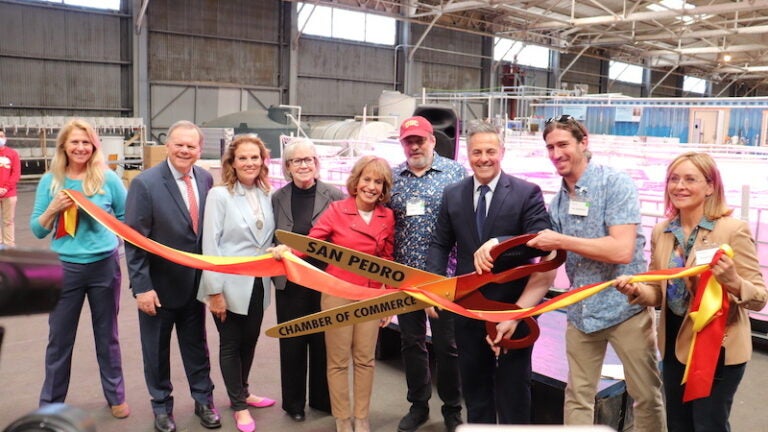
Stronger mussels? USC joins AltaSea in opening a new lab to harness the power of aquaculture
USC is diving into aquaculture, working with a growing research accelerator near the Port of Los Angeles so that researchers can focus on strengthening the survivability of farmed oysters, mussels and giant kelp to help them and the food supply thrive.
USC and AltaSea recently celebrated the opening of a set of new aquaculture labs in AltaSea’s warehouse on a 35-acre property in San Pedro.
Part of the so-called “blue economy,” AltaSea is working with researchers and businesses to tap into ocean resources in sustainable ways and enhance ocean plants and fishes’ resilience to climate change.
The USC Dornsife Nuzhdin Aquaculture Lab has an area of 24 tanks. Some are dedicated to the cultivation of giant kelp for research on its potential as a biofuel and food resource. Another portion of the lab holds large tanks where graduate students are raising oysters and mussels.
Jordan Chancellor, a PhD student working in Nuzhdin’s lab at AltaSea, has started growing oysters and mussels to test them under stressful conditions. She aims to identify and study those genes that make them especially resilient to the extremes wrought by climate change or other changes in the water’s chemistry.
Her work could help seafood farmers in California’s $200 million growing aquaculture trade produce more sustainable types of mussels and oysters. A resilient shellfish population could reduce uncertainties in supply.
Kelp is gaining wider popularity as a climate-friendly vegetable and seasoning agent. It has even been used for producing edible coatings that safely encase pills. More recently, kelp has demonstrated its potential as a source for biofuel in recent studies led by Diane Young Kim, adjunct assistant professor of environmental studies at USC Dornsife and program administrator at USC Dornsife’s Wrigley Institute for Environmental Studies.
AltaSea is supported by USC alumni and philanthropists Melanie and Richard Lundquist. Melanie Lundquist, a member of the USC Rossier School of Education Board of Councilors, said that when she learned about AltaSea, she could immediately foresee its potential.
The Lundquists gave $5 million, drawn by the interest and vision of Leonard Aube, the late executive director of the Annenberg Foundation who passed away in 2015. Lundquist called Aube the driving force behind AltaSea.
“This is not just for Len,” she said. “It’s for the bigger picture of what AltaSea could become for our kids’ and our planet’s future.”